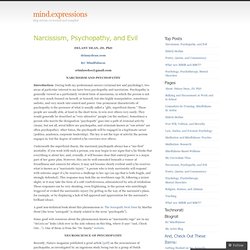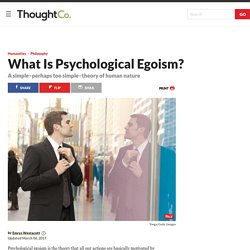

Curlie - Science: Social Sciences: Psychology: Intelligence: Emotional Intelligence. Speech patterns give away psychopaths. NEW YORK — Psychopaths are known to be wily and manipulative, but even so, they unconsciously betray themselves, according to scientists who have looked for patterns in convicted murderers' speech as they described their crimes.

The researchers interviewed 52 convicted murderers, 14 of them ranked as psychopaths according to the Psychopathy Checklist-Revised, a 20-item assessment, and asked them to describe their crimes in detail. Using computer programs to analyze what the men said, the researchers found that those with psychopathic scores showed a lack of emotion, spoke in terms of cause-and-effect when describing their crimes, and focused their attention on basic needs, such as food, drink and money. [10 Contested Death Penalty Cases] Alexithymia. Alexithymia is a personality construct characterized by the subclinical inability to identify and describe emotions in the self.[1] The core characteristics of alexithymia are marked dysfunction in emotional awareness, social attachment, and interpersonal relating.[2] Furthermore, people with alexithymia have difficulty in distinguishing and appreciating the emotions of others, which is thought to lead to unempathic and ineffective emotional responding.[2] Alexithymia occurs in approximately 10% of the population and can occur with a number of psychiatric conditions.[3] Classification Alexithymia is considered to be a personality trait that places affected individuals at risk for other medical and psychiatric disorders while reducing the likelihood that these individuals will respond to conventional treatments for the other conditions.[4] Alexithymia is not classified as a mental disorder in the fourth edition of the Diagnostic and Statistical Manual of Mental Disorders.

Psychologist R. The Psychopath: The Mask of Sanity. Narcissism, Psychopathy, and Evil « mind.expressions. DELANY DEAN, JD, PhD delanydean.com KC Mindfulness crimlawdoc@gmail.com Introduction: During both my professional careers (criminal law and psychology), two areas of particular interest to me have been psychopathy and narcissism.

Psychological Egoism. What Is Psychological Egoism? Psychological egoism is the theory that all our actions are basically motivated by self-interest.

It is a view endorsed by several philosophers, among them Thomas Hobbes and Friedrich Nietzsche, and has played a role in some game theory. Why think that all our actions are self-interested? A self-interested action is one that is motivated by a concern for one’s own interests. Clearly, most of our actions are of this sort. I get a drink of water because I have an interest in quenching my thirst.
A motorist who stops to help someone who has broken down.A person giving money to charity.A soldier falling on a grenade to protect others from the explosion. But psychological egoists think they can explain such actions without abandoning their theory. Is Precognition Real? Cornell University Lab Releases Powerful New Evidence that the Human Mind can Perceive the Future. According to today’s conventional scientific wisdom, time flows strictly forward — from the past to the future through the present.

We can remember the past, and we can predict the future based on the past (albeit imperfectly) — but we can’t perceive the future. But if the recent data from the lab of Prof. Daryl Bem at Cornell University is correct, conventional scientific wisdom may need some corrections on this particular point. In a research paper titled Feeling the Future, recently accepted for publication in the prestigious Journal of Personality and Social Psychology, Bem presents some rather compelling empirical evidence that in some cases — and with weak but highly statistically significant accuracy – many human beings can directly perceive the future.
Not just predict it based on the past. A pre-publication copy of Bem’s paper is available on his website, and it should appear on the journal’s website shortly. Henry Staten: ‘Radical evil’ revived / Radical Philosophy. ‘Radical evil’ revived Hitler, Kant, Luther, neo-Lacanianism Henry staten.

A List Of Emotions And Facial Expressions. The Six Basic Emotions and Expressions Charles Darwin wrote in his 1872 book, The Expression of the Emotions in Man and Animals that “facial expressions of emotion are universal, not learned differently in each culture.”

There have been arguments both in favor and against ever since. The most notable research into the topic came from psychologist Paul Ekman, who pioneered research into emotion recognition in the 1960s. His team of researchers provided their test subjects with photos of faces showing different emotional expressions. The test subjects then had to define the emotional states they saw in each photo, based on a predetermined list of possible emotions they had seen prior. Through these studies, Ekman found a high agreement across members of Western and Eastern cultures when it came to selecting emotional labels that corresponded with facial expressions.
From this study, the six basic emotions were proposed. 1. The Psychology of Sadomasochism. Source: Pixabay [Article updated on 21 June 2019.]

Sadomasochism can be defined as the giving or receiving of pleasure, often sexual, from the infliction or reception of pain or humiliation. It can feature as an enhancement to sexual pleasure, or, in some cases, as a substitute or sine qua non. The Pleasure of the Pain and Why Some People Need S and M - Sadomasochistic Sex. Wikiwand.